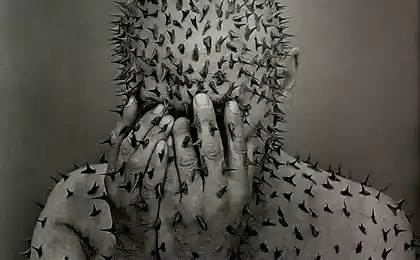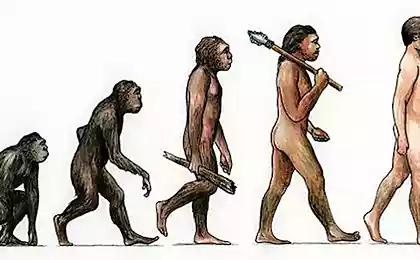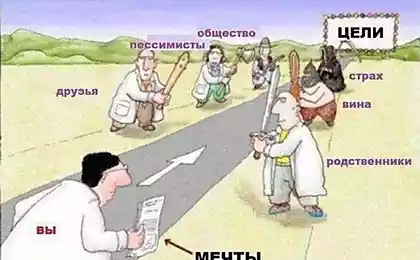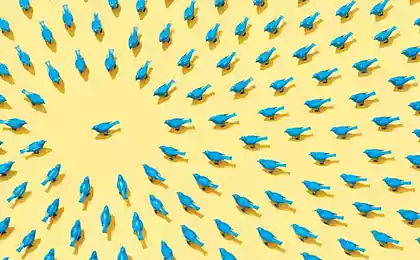588
Catalysts of change: Jennifer Dzheket about how shame will save the world
Eighty three million six hundred sixteen thousand nine hundred fifty six
Jennifer Dzheket believes that we underestimate the role, at first glance, such unimportant things like shame and pride for their deeds. According to her research in the University of UBC, in primitive society, the main controlling factor of human activity was that the man was constantly on everyone's mind. When society grew to modern sizes, the mechanism has changed: a man no longer restrains the supervision of the middle, but instead there was another element — reputation. Social media is even more aggravated this mechanism — information about a particular person available to all and distributed at breakneck speed. Article Dzheket about how responsibility and the fear guilty before society will lead to the fact that people will reasonably relates to consumption and the environment.
In the midst of the global economic crisis, the financiers have received almost $ 20 billion allowances in 2008 and about 245 billion dollars in public subsidies. And in 2008, more than 3 million homes in America were alienated from the owners for the debts due to gross mistakes on mortgages approved by the same financiers. In the beginning of 2009, Citigroup had offered to buy for the needs of top management of jet worth $ 50 million, not long after the conglomerate has received $ 45 million of taxpayer funds. Several days later President Barack Obama in the oval office of the White house has mentioned this event during the interview. About the plane he said "they know better", and surcharges in this case were "shameful".
What is the purpose of shame? If it really is shame necessary? These questions I ask myself today. In the end, not some bankers concern in our time. Most social conflicts shows that the same opposition of interests of the individual and the group. Questions on power supply, shortage of food and water, disruption of climate, declining fisheries, increasing organism resistance to antibiotics, the threat of nuclear war — all fall within the definition of human tragedies in which the interest of a particular individual comes into conflict with the good of the majority.
Individualism vs. cooperation Balance between collective and private interests has never been easily achievable, and yet the human society demonstrates a high level of cooperation. To reach this level, required the development of certain properties, including such emotions as shame. Shame is what should happen if the individual is unable to communicate with the group. Shame regulates social behavior and serves as a warning of punishment, he calls for people to appropriate or carry all the responsibility for the consequences of their actions. The earliest manifestation of feelings of shame, most likely, dealt with bad management, greed and incompetence. Thus, the fault is generated by standards adopted by the individual, shame appears as a result of standards adopted in the team. So shame, unlike guilt, occurs only in the presence of other people.
The first hominids understood the mutual aid and the failure of communication only on personal observations. Many of the animals decide to join them to each other or not, based on what they witnessed. For example, a biologist Redouane Bari discovered that reef fishes in the Red sea watching gubanyi clean other reef fish before himself to communicate with them: they want to understand how gubanyi workable. Bari was scuba diving off the coast of Egypt and watched these highly symbolic relations. Blue gubanyi (Labroides dimidiatus) eat the parasites and dead or infected tissues of reef fish with more than two thousand times a day, and each of these acts of symbiosis can be called cooperation. Gubankov, of course, attracted by the opportunity to eat more, however, if reef fish lose too much flesh in this Union, it will refuse to work with guanchica. Reef fish swim up to kubanicum, which see the successful work with other "clients", and avoid those that bite off more than you need.
As blue gubanyi, people interact better when they feel they are under surveillance. Researchers from the University of Newcastle-upon-Tyne examined the effect that a pair of tracking eyes on people who buy tea and coffee in the honesty box system (when the money falls in the intended for them the container, and not given to the seller. — Approx. ed.). For ten weeks, images of flowers and human faces were glued to the container for coffee in the University cafeteria. Each image is hung on the container a week. The researchers found that people were paying for drinks almost three times as often in those weeks when they met on the container the human eye gazing at them from the poster.
Under the gaze of the middle Feeling that you are being monitored enhances the interaction, but it also works the opposite — the opportunity to observe others. Try to see what others — a fundamental component of human nature. As well as adaptability. The more collectively human society, all the more important for its members to meet collective standards and stronger in such society, the role of shame. Shame serves as a warning to follow the collective standards, deviation from which is punishable. A individualistic society, however, moved away from this linear system of punishment and chose the penitentiary system of the third party: police law enforcement system, legal contracts, court proceedings.
Maybe that's why it's weird to see people experiencing the feeling of shame: shame for centuries invites others to punish the guilty for a misdemeanor. Take the gambling, the blacklists during the strikes of the trade unions or the Scarlet letter, Nathaniel Hawthorne. Or offer staunch conservative William F. Buckley, Jr. in 1986 to tattoo people with HIV. These attempts to the tradition of men to shame and induce in them feelings of shame today seem an insult to the rights and freedoms of the individual. Getting rid of the idea of public censure appears to be very correct, especially when it comes to regulating individual behavior that does not cause any harm to others. The rejection of public legend shame has led to the fact that society has become more reliant on the personal guilt of each individual in an attempt to achieve interaction.
Guilt is an emotion, dominant in many social issues of our time, including in the sphere of my own research: the crisis of fisheries. The root of the problem of overexploitation of fish stocks lies in the human appetite. The catch of wild fish are declining, and many of us begin to try to avoid the feeling of guilt caused by eating depleted marine products. For example, just a few recent headlines from major Newspapers: "Holy mackerel and other fish, which does not require your guilt" ("new York times"), "Sushi without guilt" ("Christian science Monitor"), "Codfish and potatoes? Choose a side in our guide to seafood, not to feel guilty" ("the times of London") and "a Good appetite: seafood, easily and without guilt" ("new York times").
It is perhaps surprising that there is a set of tools to soothe feelings of guilt and, in the case of seafood, correcting the appetite. These tools are designed to redirect the need for one type of seafood to another. Card wallet app for iPhone and ecolable tell the consumer about what fish you should and what should not be there. In Europe, for buyers, there are special rules that allow them to measure the quantity of purchased fish and avoid buying fry.
Innocent consumption guilt in abundance occurs in situations concerning the rational use of natural resources. It is guilt motivates mom to use for bathing the same water in which it bathed her daughter. Buyers in Los Angeles refuse to buy blueberries from Chile, not wanting to participate in the waste of fuel consumed in transporting the berries. One woman felt a sense of guilt for the loss of the natural environment crops of cocoa and refused to buy chocolate that her husband commented: "It deprived "exit to Eden" Paradise of pleasure". As in the Middle ages, pious men sought to buy relieves the burden of guilt of the papal indulgences, and today's consumer is stifled by the burden of guilt buys compensation of carbon emissions, led light bulbs and hybrid cars.
The problem is that this guilt is caused by the environment, although produces outstanding organic food, however, does not provide any outstanding results. One chain of supermarkets pasted on their fish counters the labels, telling about how what kind of seafood is rare. Sales of products under a green label "best choice" has increased on the average by 29 per cent over the week. Sales of products under a yellow label "buy with caution" fell by 27 percent over the week. However, sales of products under the red label "worst choice", that is, the sale of products made from species that are killed in extremely actively, remained the same. Also in the period from 1980 to 2008, sales of pesticides increased by 36 percent in California — the home of the concept of "organic food". Despite these sporadic examples, such as joint operation of vehicles and the use of cloth bags at grocery stores instead of plastic bags the need for fuel in the US has increased since 1990 by 30 percent overall and 5 percent per person. Of course, a positive effect of the activity of buyers-the idealists is, however, it is offset by the growing needs and increasing number of other customers.
Guilt is a valuable emotion, but it feels only the individual, and therefore it only motivates individuals. Another disadvantage is that it is caused by values that are being manipulated by this particular individual. If some values are not enough, then guilt arises, and hence the action (as in the example of sales of products under the red label "worst choice": nothing has changed).
The state brought to shame, as mentioned above, are not welcome in the regulation of private behavior that does no harm to others. But what about the behavior that causes harm to others? The national public register of persons who have committed sexual offenses in the United States, provides a free online database containing the names, photos and addresses of offenders who have committed sexual offenses. And in March 2010, the Nebraska legislature passed a law allowing the state to publish the names and addresses of people who owed taxes in excess of 20 thousand dollars. In several States judges prescribe punishment based on the idea of tradition public censure: for example, sentence pickpockets and robbers to wear in public signs that described their crimes. Such examples are brought to shame and inducing feelings of shame may prevent bad behaviour, however, critics like Martha Nussbaum, a political philosopher from the University of Chicago, argue that the legend to the shame of the government is contrary to the rules on insulting the feelings of self-esteem.
What if the government will not be involved in the act of surrendering to the shame? One County in Leicester, England, has a YouTube channel dedicated to local issues, including the capture of the "little shits". Collection of videos shows different people, caught up in the moment when they litter on the street. If anyone finds out photographed person, it may send information about who this email to the management district, which in turn give it to the city Council that the collected fines. After the penalty video is removed. In 2008, a reporter from Santa Fe published the names and addresses of the owners of the ten houses, the most actively consuming water in the city (first place was taken by the owner who used the water in 21 times more than the average consumption in a residential building). Tennis club near my house in Vancouver, British Columbia, publishes lists of people who had not paid their membership fees. In each of these cases, the actions of individuals affect the entire team. None of them, the state does not act as a legend shame. Is it fair to use a sense of shame in this way? And effectively?
Corporate reputation Let's start with the last question. Shame can change behaviour in those particular cases, but in the world of the urgent problems of global scale behavior change of one individual is insignificant. Small changes, taken once a single individual, can push the problem to the solution only if the problem is very small or if her decision is a lot of time (for example, as in the case with the exception of the use of politically incorrect words). Many of today's social movements, as well as the industry that they are trying to dramatically change, must make big changes quickly — that is best accomplished by directing efforts directly towards the relevant institutions. I call this phenomenon vertical agitation. A reporter from Santa Fe, along with the list of the most wasteful in water use of houses has also published a list of ten commercial enterprises that use water uneconomical. First place in this list took the city of Santa Fe, wasting water 195 times more than taking the first place in the consumption of water house. Now let's imagine that will make a greater impact: the adoption of a system for saving of water or the reforming of a single dwelling house?
Guilt can't work at the level of institutions, as it is based on the moral principles of each individual, and they have different people vary widely. But the shame is not only one moral code. As it is a feeling implanted surrounding the audience, it has a direct relationship to reputation, which is important for any institution. In 2004, the meeting of the Chairpersons of the Board of the world economic forum in Davos, Switzerland, ended with the press release, which indicated that the corporate reputation of the brand has surpassed in importance the financial income as an indicator of success. For greater visibility, as shame and reputation are linked, let's think about restaurant hygiene cards, which in the interests of health of citizens was put into circulation in Los Angeles County in 1998 and acted as the system is brought to shame. Restaurants were required to put a card with points corresponding to their level of hygiene at the time of the most recent state inspection. Giant rating on the Windows — A, B and C — encouraged restaurants, keeping yourself clean, and chastised those that were paying less attention. Scorecard based on the following facts led to the growth of the buyers of sensitivity in regards to restaurant hygiene, reduction throughout the district of hospitalizations caused by food poisoning by 20 percent and to an overall improvement in hygiene in County restaurants.
Gossip like therapy , Remember that in the early stages of our evolution we were able to assess cooperation only from personal experience. With the increase of the staff of ancient people faced with the need of interaction, the human mind became capable to keep in mind the many laws that apply to many people. The need to keep increasing the number of social ties and observe each other's actions, quite possibly, was the reason that we learned to speak, according to British anthropologist Robin Dunbar. Then, five thousand years ago, there is another tool — writing. Language, both oral and written, gave rise to rumors — vector social media. Research Ralph Sommerfeld from the Institute of evolutionary biology, max Planck and his colleagues focused on multiplayer games that allow their members to gossip about other players. The positive gossip became the cohesive interaction of the participants of the experiment. What is even more interesting, rumors have influenced the perception of some players other players, despite the fact that they all had access to the information firsthand.
The human community is now so large that its size has outgrown the capabilities of our imagination. And the number of people and standards is increasing. What tool would allow us to gossip in the scale of such a giant group? In our days we watch the news and then pass an unprecedented amount of information using computer technology. For example, journalists, interest groups, and indeed anyone can access the online database of the US Agency for the protection of the environment from toxic waste, to identify the perpetrators and expose them to shame. In the period since the establishment of the database in 1988 and until 1995, the 330 emission of toxic substances has decreased by 45 percent. After the network operator Trader Joe's has ignored attempts by Greenpeace to stop sales of rare seafood, Greenpeace organized with the help of online demonstration and calls to the Trader Joe stores across the country, where on the other end singing mechanical fish. Director of the network eventually decided to compromise with the demands of Greenpeace.
Constraints We can use computers to simulate the intimacy of tribal life, but we need people around to have any sense of shame, which would lead us to interaction. The emergence of new tools — whether it be language, writing or the Internet can not replace our eyes. Meeting face-to-face, such as in the case of Trader Joe stores still remain the most expressive form of dispute. So, what do not allow shame to become a catalyst for social change? I see several drawbacks:
1. The modern world is replete with ephemeral, "one-time" human interactions. When you know you are unlikely to be in the same situation with the same people again, there is not a desire to change their behavior. Research shows, however, that if people are aware of the fact that meet again, their relationship immediately improved. The sense of shame works best in cases where the probability of re-encounters big. In the world of disposable Dating we can try to compensate for the anonymity of the visual counters: cards with points for the cleanliness of the restaurant or seller ratings on eBay that are designed to help the team to determine what the opportunity of successful cooperation with specific individual or institution.
2. The modern world allows you to blur their individuality. Remember reef fish, to observe the work of the blue Gubankov in the Red sea. Gubanyi seem to know they're being watched, and some of them build a reputation on serving small reef fish, allowing the larger fish to watch. Then, when a big fish requires cleaning, gubanyi devour it not only parasites, but also a certain amount of flesh, fattening themselves and retreating from the debt. And life on the reef was absolutely confusing, there are still about gubanyi (Aspidontus taeniatus), which live in what looks very similar to the real blue Gubankov. Under the guise of cooperation, they swam to the reef fish, and then they bite off pieces of healthy flesh and flee.
Many of our meetings very much like this process of cleansing in the Red sea. It is difficult to understand who really wants to cooperate and who does not want to, especially when it comes to institutions. Corporation Enron in 2001 was hiding one of the largest bankruptcies in U.S. history, hiding their debts by billions of dollars, hundreds of shell companies, buying falling shares of the Corporation that the Corporation could create a front company to mislead the auditors. Lehman Brothers in the years before the crisis of 2008 used a less large firm Hudson Castle (with 25% of its shares) in order to translate records about risky investments in its reports, and to shift the responsibility for all risks. All this leads us to the third weakness of the effectiveness of shame.
3. The main drawback of shame is its lack. Some people have shame, simply no. During the research I conducted with my colleagues, first-year students were involved in different games that require teamwork. The results of the experiment showed that shame is not always encourages the cooperation of players, the least prone to interference. This conclusion leads to the assumption that some of the world's population will always have to behave absolutely shamelessly, how about gubanich, unless the game is really worth it. Banks may have gone bankrupt, but the bankers got their bonuses. It was even said that if you publish a list of the personal incomes of the bankers, this will lead to envy from others, but not to shame.
The action my colleagues and I came to the conclusion that shame is not sufficient to be a catalyst for great social change. Slavery was not abolished due to the fact that the abolitionist was ashamed of the slave-owners and encouraged them to emancipate slaves. Child labor in factories was not stopped due to the fact that the factory was ashamed and forbade children to work. The destruction of the ozone layer is not slowed down due to the fact that the industrial enterprises ashamed, to produce products containing CFCs. Therefore, the penalty is a necessity. Even if one shame was enough to make most individuals behave, States need a system of punishment to protect the team from players who do not wish to cooperate.
Finally, look at those who are part of the team. Today we face an additional difficulty of achieving a balance between the interests of humans and other life forms. How can you encourage the interaction of all living beings, only when people have a voice? To succeed, most likely, those individuals who understand, consciously or subconsciously, the interdependence of all life on the planet. And if people want to be the ones who succeed, our collective shame over destroying other life-forms should grow to the same extent that our knowledge about the environmental roles of all living beings. Maybe the same attention to each other, which initially triggered our own evolution, will help us to save other species and ultimately ourselves.
Source: theoryandpractice.ru
Jennifer Dzheket believes that we underestimate the role, at first glance, such unimportant things like shame and pride for their deeds. According to her research in the University of UBC, in primitive society, the main controlling factor of human activity was that the man was constantly on everyone's mind. When society grew to modern sizes, the mechanism has changed: a man no longer restrains the supervision of the middle, but instead there was another element — reputation. Social media is even more aggravated this mechanism — information about a particular person available to all and distributed at breakneck speed. Article Dzheket about how responsibility and the fear guilty before society will lead to the fact that people will reasonably relates to consumption and the environment.
In the midst of the global economic crisis, the financiers have received almost $ 20 billion allowances in 2008 and about 245 billion dollars in public subsidies. And in 2008, more than 3 million homes in America were alienated from the owners for the debts due to gross mistakes on mortgages approved by the same financiers. In the beginning of 2009, Citigroup had offered to buy for the needs of top management of jet worth $ 50 million, not long after the conglomerate has received $ 45 million of taxpayer funds. Several days later President Barack Obama in the oval office of the White house has mentioned this event during the interview. About the plane he said "they know better", and surcharges in this case were "shameful".
What is the purpose of shame? If it really is shame necessary? These questions I ask myself today. In the end, not some bankers concern in our time. Most social conflicts shows that the same opposition of interests of the individual and the group. Questions on power supply, shortage of food and water, disruption of climate, declining fisheries, increasing organism resistance to antibiotics, the threat of nuclear war — all fall within the definition of human tragedies in which the interest of a particular individual comes into conflict with the good of the majority.
Individualism vs. cooperation Balance between collective and private interests has never been easily achievable, and yet the human society demonstrates a high level of cooperation. To reach this level, required the development of certain properties, including such emotions as shame. Shame is what should happen if the individual is unable to communicate with the group. Shame regulates social behavior and serves as a warning of punishment, he calls for people to appropriate or carry all the responsibility for the consequences of their actions. The earliest manifestation of feelings of shame, most likely, dealt with bad management, greed and incompetence. Thus, the fault is generated by standards adopted by the individual, shame appears as a result of standards adopted in the team. So shame, unlike guilt, occurs only in the presence of other people.
The first hominids understood the mutual aid and the failure of communication only on personal observations. Many of the animals decide to join them to each other or not, based on what they witnessed. For example, a biologist Redouane Bari discovered that reef fishes in the Red sea watching gubanyi clean other reef fish before himself to communicate with them: they want to understand how gubanyi workable. Bari was scuba diving off the coast of Egypt and watched these highly symbolic relations. Blue gubanyi (Labroides dimidiatus) eat the parasites and dead or infected tissues of reef fish with more than two thousand times a day, and each of these acts of symbiosis can be called cooperation. Gubankov, of course, attracted by the opportunity to eat more, however, if reef fish lose too much flesh in this Union, it will refuse to work with guanchica. Reef fish swim up to kubanicum, which see the successful work with other "clients", and avoid those that bite off more than you need.
As blue gubanyi, people interact better when they feel they are under surveillance. Researchers from the University of Newcastle-upon-Tyne examined the effect that a pair of tracking eyes on people who buy tea and coffee in the honesty box system (when the money falls in the intended for them the container, and not given to the seller. — Approx. ed.). For ten weeks, images of flowers and human faces were glued to the container for coffee in the University cafeteria. Each image is hung on the container a week. The researchers found that people were paying for drinks almost three times as often in those weeks when they met on the container the human eye gazing at them from the poster.
Under the gaze of the middle Feeling that you are being monitored enhances the interaction, but it also works the opposite — the opportunity to observe others. Try to see what others — a fundamental component of human nature. As well as adaptability. The more collectively human society, all the more important for its members to meet collective standards and stronger in such society, the role of shame. Shame serves as a warning to follow the collective standards, deviation from which is punishable. A individualistic society, however, moved away from this linear system of punishment and chose the penitentiary system of the third party: police law enforcement system, legal contracts, court proceedings.
Maybe that's why it's weird to see people experiencing the feeling of shame: shame for centuries invites others to punish the guilty for a misdemeanor. Take the gambling, the blacklists during the strikes of the trade unions or the Scarlet letter, Nathaniel Hawthorne. Or offer staunch conservative William F. Buckley, Jr. in 1986 to tattoo people with HIV. These attempts to the tradition of men to shame and induce in them feelings of shame today seem an insult to the rights and freedoms of the individual. Getting rid of the idea of public censure appears to be very correct, especially when it comes to regulating individual behavior that does not cause any harm to others. The rejection of public legend shame has led to the fact that society has become more reliant on the personal guilt of each individual in an attempt to achieve interaction.
Guilt is an emotion, dominant in many social issues of our time, including in the sphere of my own research: the crisis of fisheries. The root of the problem of overexploitation of fish stocks lies in the human appetite. The catch of wild fish are declining, and many of us begin to try to avoid the feeling of guilt caused by eating depleted marine products. For example, just a few recent headlines from major Newspapers: "Holy mackerel and other fish, which does not require your guilt" ("new York times"), "Sushi without guilt" ("Christian science Monitor"), "Codfish and potatoes? Choose a side in our guide to seafood, not to feel guilty" ("the times of London") and "a Good appetite: seafood, easily and without guilt" ("new York times").
It is perhaps surprising that there is a set of tools to soothe feelings of guilt and, in the case of seafood, correcting the appetite. These tools are designed to redirect the need for one type of seafood to another. Card wallet app for iPhone and ecolable tell the consumer about what fish you should and what should not be there. In Europe, for buyers, there are special rules that allow them to measure the quantity of purchased fish and avoid buying fry.
Innocent consumption guilt in abundance occurs in situations concerning the rational use of natural resources. It is guilt motivates mom to use for bathing the same water in which it bathed her daughter. Buyers in Los Angeles refuse to buy blueberries from Chile, not wanting to participate in the waste of fuel consumed in transporting the berries. One woman felt a sense of guilt for the loss of the natural environment crops of cocoa and refused to buy chocolate that her husband commented: "It deprived "exit to Eden" Paradise of pleasure". As in the Middle ages, pious men sought to buy relieves the burden of guilt of the papal indulgences, and today's consumer is stifled by the burden of guilt buys compensation of carbon emissions, led light bulbs and hybrid cars.
The problem is that this guilt is caused by the environment, although produces outstanding organic food, however, does not provide any outstanding results. One chain of supermarkets pasted on their fish counters the labels, telling about how what kind of seafood is rare. Sales of products under a green label "best choice" has increased on the average by 29 per cent over the week. Sales of products under a yellow label "buy with caution" fell by 27 percent over the week. However, sales of products under the red label "worst choice", that is, the sale of products made from species that are killed in extremely actively, remained the same. Also in the period from 1980 to 2008, sales of pesticides increased by 36 percent in California — the home of the concept of "organic food". Despite these sporadic examples, such as joint operation of vehicles and the use of cloth bags at grocery stores instead of plastic bags the need for fuel in the US has increased since 1990 by 30 percent overall and 5 percent per person. Of course, a positive effect of the activity of buyers-the idealists is, however, it is offset by the growing needs and increasing number of other customers.
Guilt is a valuable emotion, but it feels only the individual, and therefore it only motivates individuals. Another disadvantage is that it is caused by values that are being manipulated by this particular individual. If some values are not enough, then guilt arises, and hence the action (as in the example of sales of products under the red label "worst choice": nothing has changed).
The state brought to shame, as mentioned above, are not welcome in the regulation of private behavior that does no harm to others. But what about the behavior that causes harm to others? The national public register of persons who have committed sexual offenses in the United States, provides a free online database containing the names, photos and addresses of offenders who have committed sexual offenses. And in March 2010, the Nebraska legislature passed a law allowing the state to publish the names and addresses of people who owed taxes in excess of 20 thousand dollars. In several States judges prescribe punishment based on the idea of tradition public censure: for example, sentence pickpockets and robbers to wear in public signs that described their crimes. Such examples are brought to shame and inducing feelings of shame may prevent bad behaviour, however, critics like Martha Nussbaum, a political philosopher from the University of Chicago, argue that the legend to the shame of the government is contrary to the rules on insulting the feelings of self-esteem.
What if the government will not be involved in the act of surrendering to the shame? One County in Leicester, England, has a YouTube channel dedicated to local issues, including the capture of the "little shits". Collection of videos shows different people, caught up in the moment when they litter on the street. If anyone finds out photographed person, it may send information about who this email to the management district, which in turn give it to the city Council that the collected fines. After the penalty video is removed. In 2008, a reporter from Santa Fe published the names and addresses of the owners of the ten houses, the most actively consuming water in the city (first place was taken by the owner who used the water in 21 times more than the average consumption in a residential building). Tennis club near my house in Vancouver, British Columbia, publishes lists of people who had not paid their membership fees. In each of these cases, the actions of individuals affect the entire team. None of them, the state does not act as a legend shame. Is it fair to use a sense of shame in this way? And effectively?
Corporate reputation Let's start with the last question. Shame can change behaviour in those particular cases, but in the world of the urgent problems of global scale behavior change of one individual is insignificant. Small changes, taken once a single individual, can push the problem to the solution only if the problem is very small or if her decision is a lot of time (for example, as in the case with the exception of the use of politically incorrect words). Many of today's social movements, as well as the industry that they are trying to dramatically change, must make big changes quickly — that is best accomplished by directing efforts directly towards the relevant institutions. I call this phenomenon vertical agitation. A reporter from Santa Fe, along with the list of the most wasteful in water use of houses has also published a list of ten commercial enterprises that use water uneconomical. First place in this list took the city of Santa Fe, wasting water 195 times more than taking the first place in the consumption of water house. Now let's imagine that will make a greater impact: the adoption of a system for saving of water or the reforming of a single dwelling house?
Guilt can't work at the level of institutions, as it is based on the moral principles of each individual, and they have different people vary widely. But the shame is not only one moral code. As it is a feeling implanted surrounding the audience, it has a direct relationship to reputation, which is important for any institution. In 2004, the meeting of the Chairpersons of the Board of the world economic forum in Davos, Switzerland, ended with the press release, which indicated that the corporate reputation of the brand has surpassed in importance the financial income as an indicator of success. For greater visibility, as shame and reputation are linked, let's think about restaurant hygiene cards, which in the interests of health of citizens was put into circulation in Los Angeles County in 1998 and acted as the system is brought to shame. Restaurants were required to put a card with points corresponding to their level of hygiene at the time of the most recent state inspection. Giant rating on the Windows — A, B and C — encouraged restaurants, keeping yourself clean, and chastised those that were paying less attention. Scorecard based on the following facts led to the growth of the buyers of sensitivity in regards to restaurant hygiene, reduction throughout the district of hospitalizations caused by food poisoning by 20 percent and to an overall improvement in hygiene in County restaurants.
Gossip like therapy , Remember that in the early stages of our evolution we were able to assess cooperation only from personal experience. With the increase of the staff of ancient people faced with the need of interaction, the human mind became capable to keep in mind the many laws that apply to many people. The need to keep increasing the number of social ties and observe each other's actions, quite possibly, was the reason that we learned to speak, according to British anthropologist Robin Dunbar. Then, five thousand years ago, there is another tool — writing. Language, both oral and written, gave rise to rumors — vector social media. Research Ralph Sommerfeld from the Institute of evolutionary biology, max Planck and his colleagues focused on multiplayer games that allow their members to gossip about other players. The positive gossip became the cohesive interaction of the participants of the experiment. What is even more interesting, rumors have influenced the perception of some players other players, despite the fact that they all had access to the information firsthand.
The human community is now so large that its size has outgrown the capabilities of our imagination. And the number of people and standards is increasing. What tool would allow us to gossip in the scale of such a giant group? In our days we watch the news and then pass an unprecedented amount of information using computer technology. For example, journalists, interest groups, and indeed anyone can access the online database of the US Agency for the protection of the environment from toxic waste, to identify the perpetrators and expose them to shame. In the period since the establishment of the database in 1988 and until 1995, the 330 emission of toxic substances has decreased by 45 percent. After the network operator Trader Joe's has ignored attempts by Greenpeace to stop sales of rare seafood, Greenpeace organized with the help of online demonstration and calls to the Trader Joe stores across the country, where on the other end singing mechanical fish. Director of the network eventually decided to compromise with the demands of Greenpeace.
Constraints We can use computers to simulate the intimacy of tribal life, but we need people around to have any sense of shame, which would lead us to interaction. The emergence of new tools — whether it be language, writing or the Internet can not replace our eyes. Meeting face-to-face, such as in the case of Trader Joe stores still remain the most expressive form of dispute. So, what do not allow shame to become a catalyst for social change? I see several drawbacks:
1. The modern world is replete with ephemeral, "one-time" human interactions. When you know you are unlikely to be in the same situation with the same people again, there is not a desire to change their behavior. Research shows, however, that if people are aware of the fact that meet again, their relationship immediately improved. The sense of shame works best in cases where the probability of re-encounters big. In the world of disposable Dating we can try to compensate for the anonymity of the visual counters: cards with points for the cleanliness of the restaurant or seller ratings on eBay that are designed to help the team to determine what the opportunity of successful cooperation with specific individual or institution.
2. The modern world allows you to blur their individuality. Remember reef fish, to observe the work of the blue Gubankov in the Red sea. Gubanyi seem to know they're being watched, and some of them build a reputation on serving small reef fish, allowing the larger fish to watch. Then, when a big fish requires cleaning, gubanyi devour it not only parasites, but also a certain amount of flesh, fattening themselves and retreating from the debt. And life on the reef was absolutely confusing, there are still about gubanyi (Aspidontus taeniatus), which live in what looks very similar to the real blue Gubankov. Under the guise of cooperation, they swam to the reef fish, and then they bite off pieces of healthy flesh and flee.
Many of our meetings very much like this process of cleansing in the Red sea. It is difficult to understand who really wants to cooperate and who does not want to, especially when it comes to institutions. Corporation Enron in 2001 was hiding one of the largest bankruptcies in U.S. history, hiding their debts by billions of dollars, hundreds of shell companies, buying falling shares of the Corporation that the Corporation could create a front company to mislead the auditors. Lehman Brothers in the years before the crisis of 2008 used a less large firm Hudson Castle (with 25% of its shares) in order to translate records about risky investments in its reports, and to shift the responsibility for all risks. All this leads us to the third weakness of the effectiveness of shame.
3. The main drawback of shame is its lack. Some people have shame, simply no. During the research I conducted with my colleagues, first-year students were involved in different games that require teamwork. The results of the experiment showed that shame is not always encourages the cooperation of players, the least prone to interference. This conclusion leads to the assumption that some of the world's population will always have to behave absolutely shamelessly, how about gubanich, unless the game is really worth it. Banks may have gone bankrupt, but the bankers got their bonuses. It was even said that if you publish a list of the personal incomes of the bankers, this will lead to envy from others, but not to shame.
The action my colleagues and I came to the conclusion that shame is not sufficient to be a catalyst for great social change. Slavery was not abolished due to the fact that the abolitionist was ashamed of the slave-owners and encouraged them to emancipate slaves. Child labor in factories was not stopped due to the fact that the factory was ashamed and forbade children to work. The destruction of the ozone layer is not slowed down due to the fact that the industrial enterprises ashamed, to produce products containing CFCs. Therefore, the penalty is a necessity. Even if one shame was enough to make most individuals behave, States need a system of punishment to protect the team from players who do not wish to cooperate.
Finally, look at those who are part of the team. Today we face an additional difficulty of achieving a balance between the interests of humans and other life forms. How can you encourage the interaction of all living beings, only when people have a voice? To succeed, most likely, those individuals who understand, consciously or subconsciously, the interdependence of all life on the planet. And if people want to be the ones who succeed, our collective shame over destroying other life-forms should grow to the same extent that our knowledge about the environmental roles of all living beings. Maybe the same attention to each other, which initially triggered our own evolution, will help us to save other species and ultimately ourselves.
Source: theoryandpractice.ru























